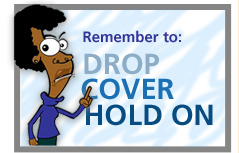|
Earthquakes can happen at any time, and most often strike with little, if any, warning. Though scientists have made significant advances in understanding how, why and where earthquakes and tsunamis may occur, no one knows when they will happen.
For this reason, we must always be prepared.
|
Every responsible member of the family should know:
- How to turn off utilities (water, gas, electricity).
- Basic first aid (contact your local Red Cross for information on first aid training).
- Where to go and what to do when a disaster strikes.
- What places in the home are safest during certain disasters.
- Whether to vacate the home in favour of a shelter or relatives' house.
- Where to find the nearest shelter.
- Where and/or how to reunite with family members.
|
- Identify possible earthquake hazards in your home. Do what you can to reduce the threat of these hazards:
- Water heaters and other appliances should be firmly bolted down
- Unstable, heavy furniture, shelves, mirrors, and large picture frames should be fastened to a wall or bolted to the floor, such as bookcases and cupboards
- When loading storage cabinets, large and heavy objects should be placed on lower shelves; brace high and top-heavy objects
- Store bottled foods, glass, china, and other breakables on low shelves or in cabinets that can fasten shut
- Make sure that gas servicing to appliances uses flexible hoses
- Store household and garden chemicals properly.
- Keep exits free of obstacles.
- Secure overhead fixtures such as lights and ceiling fans.
- Prepare an emergency supply kit for your family with enough non – perishable food and water to last at least three days. In addition, each member of the family should have a pair of sturdy shoes and a flashlight under or near their bed.
- Hold a family meeting and create an emergency action plan. Practise this plan, and review it a few times a year so that everyone can remember what to do if an earthquake ever hits.
- Remember to duplicate or store important documents and essential business records in fireproof/waterproof containers.
- Purchase emergency equipment such as battery-operated radios and fire extinguishers for your home.
- Choose two meeting points for everyone to memorize: one right outside your home, in case a fire breaks out one outside your neighbourhood, in case it is impossible to return home (e.g., your neighbourhood has been evacuated).
- Choose a long-distance/overseas family contact. Make sure that everyone in the family memorizes the contacts full name and phone number. When an earthquake hits, it is usually easier to make a long-distance/overseas call, as local phone lines get tied up quickly.
- Identify someone you can rely on to pick up your children from school in case you can't get there in an emergency situation. Notify the school and your children who it is.
- Locate safe spots and danger zones in each room of your home.
- Identify safe exit routes from each room in your home.
- Know where and how to shut off all utilities and keep a wrench handy to shut off valves.
- Family members should know basic First Aid steps. Take a first aid course.
- Practice safety drills in your home so everyone knows how to "drop, cover and hold on" and how to evacuate safely, staying clear of likely hazardous areas.
- Become actively involved in community preparedness organisations in your district. Call your national disaster organisation for contact information.
- Secure your building:
- Be sure your residence is firmly anchored to its foundation.
- Repair defective electrical wiring, leaky gas lines, and inflexible utility connections. Get appropriate professional help. Do not work with gas or electrical lines yourself.
- Adequately insure your home against this and other hazards
- Conduct maintenance inspections of your home routinely (3 months, 6 months and yearly) as well as after natural or other hazards, and undertake improvements/repairs as required.
- Install flexible pipe fittings to avoid gas or water leaks. Flexible fittings are more resistant to breakage.
- If you live in a house:
- Label the electricity main breaker panel, gas valve, and main water valves with large, easy-to-read signs.
- Ensure everyone in your family knows where and how to shut off the water, electricity, and gas supply.
- If you live in an apartment:
- Make sure everyone in your family knows where the emergency exit is (remember to use the stairs, not the elevator).
- Determine who is responsible for turning off gas mains (e.g., building manager).
- Show them where the fire alarm is, and explain when and how to use it.
Prepare an Earthquake Survivor Kit
Be prepared to be on your own without help for 72 hours or more. Assemble an emergency kit with a minimum three-day supply of food and water. Store it in a secure place that, ideally, is accessible from outside (See Survival Kit).
back to top
|













